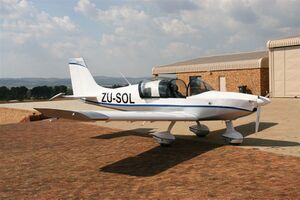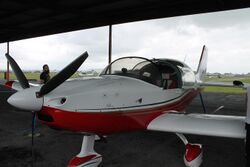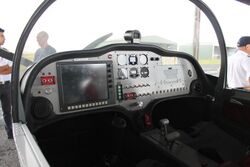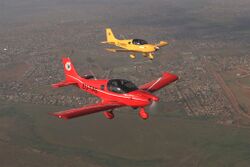Engineering:The Airplane Factory Sling 2
| Sling 2 | |
|---|---|

| |
| Sling 2 | |
| Role | Light Sport Aircraft |
| Manufacturer | The Airplane Factory |
| Designer | Mike Blyth |
| First flight | 18 November 2008 |
| Introduction | 2009 |
| Number built | 60 (2012)[1] |
| Variants | The Airplane Factory Sling 4 |


The Airplane Factory Sling 2 is a South Africa n two-seater light aircraft designed and produced by The Airplane Factory in Johannesburg, South Africa.[2] In 2009 the specially modified second prototype was flown around the world in a westerly circumnavigation which took 40 days.[3] This was the first time any aircraft of this class had achieved a circumnavigation.[4] The design complies with the requirements of four different regulatory aircraft classes.[5][6]
The design was originally known as the Sling, but was re-designated as the Sling 2 to distinguish it from the later four-seat Sling 4.
The Sling 2 is supplied as a kit and as a ready-to-fly aircraft and can be operated as a light-sport aircraft or homebuilt aircraft.
Design and development
Development of the Sling 2 commenced in 2006. The Sling is a two-seat, low wing, all metal aircraft with tricycle landing gear made from composites. The aircraft is powered by an 80 hp (60 kW) Rotax 912UL,100 hp (75 kW) Rotax 912ULS, or a 912iS engine, or optionally a turbocharged 115 hp (86 kW) Rotax 914, driving a 3-bladed Warp Drive Inc propeller. The airplane features a sliding canopy, large fuel tanks, and standard equipment includes a "glass cockpit" style display.[1][2][7][8]
Mike Blyth began working on the design of the Sling 2 in 2006; the first prototype first flew on November 18, 2008. A full testing programme followed, with the help of a South African military aerodynamicist, which was completed in 2009. Blyth and partner James Pitman then flew the second prototype around the world to accomplish a challenging circumnavigation.[4][9]
Sixty Sling 2s had been completed and flown by the end of 2012.[1][10]
Operational history
The second prototype Sling 2 was flown on a westerly global circumnavigation in 2009. Blyth and Pitman departed from South Africa flying up through Western Africa, across the Atlantic to Brazil and Guyana, up through the US Virgin Islands and the East Coast of the United States to Oshkosh, Wisconsin for EAA AirVenture Oshkosh 2009. After the air show they flew across the United States to Los Angeles, then on to Hawaii, the Marshall Islands, Micronesia, Indonesia, Malaysia, Sri Lanka, Seychelles, and finally back to South Africa. They completed the whole journey in 40 days.[3] The aircraft used for the circumnavigation was a standard production Sling, but with larger 118.8 U.S. gallons (450 L; 98.9 imp gal) fuel tanks, strengthened landing gear, seats that lie flat for sleeping and removable control sticks.[11][12] After being modified, the aircraft had an endurance at standard cruise of approximately 24 hours. The aircraft cruised at 89 knots Indicated airspeed (IAS) (98 knots True airspeed (TAS)) with almost full fuel. When more nearly empty, it would cruise at 96 knots IAS (105 knots TAS). With full fuel, fully loaded with crew the Sling weighed approximately 1,984 Lbs (900 kg), or about 600 pounds overweight. At sea level the aircraft would climb slowly, at a rate of 350 feet per minute.[1][4][12]
Specifications (Sling 2)

Data from The Airplane Factory[13]
General characteristics
- Crew: One pilot
- Capacity: One passenger
- Length: 21.9 feet (6.68 meters)
- Wingspan: 30.1 feet (9.17 meters)
- Height: 8.2 feet (2.49 meters)
- Wing area: 127.5 sq ft (11.85 sq metres)
- Empty weight: 794 lb (360 kg)
- Useful load: 526 lb (240 kg)
- Loaded weight: 1320 lb (600 kg)
- Max. takeoff weight: 1320 lb (600 kg)
- Fuel Capacity: 39.6 U.S. gallons (150 liters)
- Baggage Capacity: 77 lb (35 kg)
- Powerplant: 1 × Rotax 912ULS fixed pitch, 100 hp (73 kW)
- Propeller diameter: 70 inch (178 cm)
Performance
- Never exceed speed: 135 knots (155 mph)
- Maximum speed: 120 knots (138 mph)
- Cruise speed: 110 knots (126 mph)
- Stall speed: 45 knots (52 mph)
- Range: 800+ nm (1500+ km)
- Service ceiling: 12,000 feet (3,657 meters)
- Rate of climb: 900 ft/min (4.57 m/s)
Avionics
- MGL Avionics
See also
Aircraft of comparable role, configuration and era
References
- ↑ 1.0 1.1 1.2 1.3 Bernard, Mary and Suzanne B. Bopp: The Airplane Factory: Sling 2 (and Sling 4), Kitplanes, Volume 29, Number 12, December 2012, page 22. Belvoir Publications. ISSN 0891-1851
- ↑ 2.0 2.1 African Pilot, Athol Franz, The Aircraft Factory Sling, Dec 2010, Volume 9, Number 12, pp. 70–71.
- ↑ 3.0 3.1 "Around the World in 40 LSA Days". Plane & Pilot Magazine. http://light-sport-hangar-flyin.blogspot.com/2010/01/around-world-in-40-lsa-days.html. Retrieved 12 June 2012.
- ↑ 4.0 4.1 4.2 SA Flyer, Guy Leitch, Sling around the world, Oct 2009, No. 168, pp. 20–28.
- ↑ "Out of Steam? No Way! Welcome to Sling". http://www.bydanjohnson.com/showsplog.cfm?id=1621. Retrieved 12 June 2012.
- ↑ "LSA Registration Categories...What's the Difference?". http://www.aviatorshotline.com/content/lsa-registration-categorieswhat%E2%80%99s-difference. Retrieved 18 June 2012.
- ↑ "Sling Receives First S-LSA Certification". Archived from the original on 26 May 2012. https://web.archive.org/web/20120526012743/http://www.eaa.org/news/2012/2012-05-22_sling.asp. Retrieved 12 June 2012.
- ↑ Tacke, Willi; Marino Boric; et al: World Directory of Light Aviation 2015–16, page 83. Flying Pages Europe SARL, 2015. ISSN 1368-485X
- ↑ "Sling Design & Construction". Archived from the original on 25 June 2012. https://web.archive.org/web/20120625054811/http://www.airplanefactory.com/aircraft/design-construction/. Retrieved 14 June 2012.
- ↑ "Sling S-LSA Aero-News Announcement". http://www.aero-news.net/index.cfm?do=main.textpost&id=1da105fa-ed8b-42a5-b66f-b9c503a1d648. Retrieved 14 June 2012.
- ↑ "Spirit of Adventure". http://www.airventure.org/news/2009/090729_sling.html. Retrieved 12 June 2012.
- ↑ 12.0 12.1 "Around the World Sling Modifications". Archived from the original on 25 July 2009. https://web.archive.org/web/20090725231957/http://airplanefactory.co.za/world/aircraft.asp. Retrieved 15 June 2012.
- ↑ "Sling Specifications". Archived from the original on 25 June 2012. https://web.archive.org/web/20120625054301/http://www.airplanefactory.com/aircraft/specifications/. Retrieved 18 June 2012.
External links
